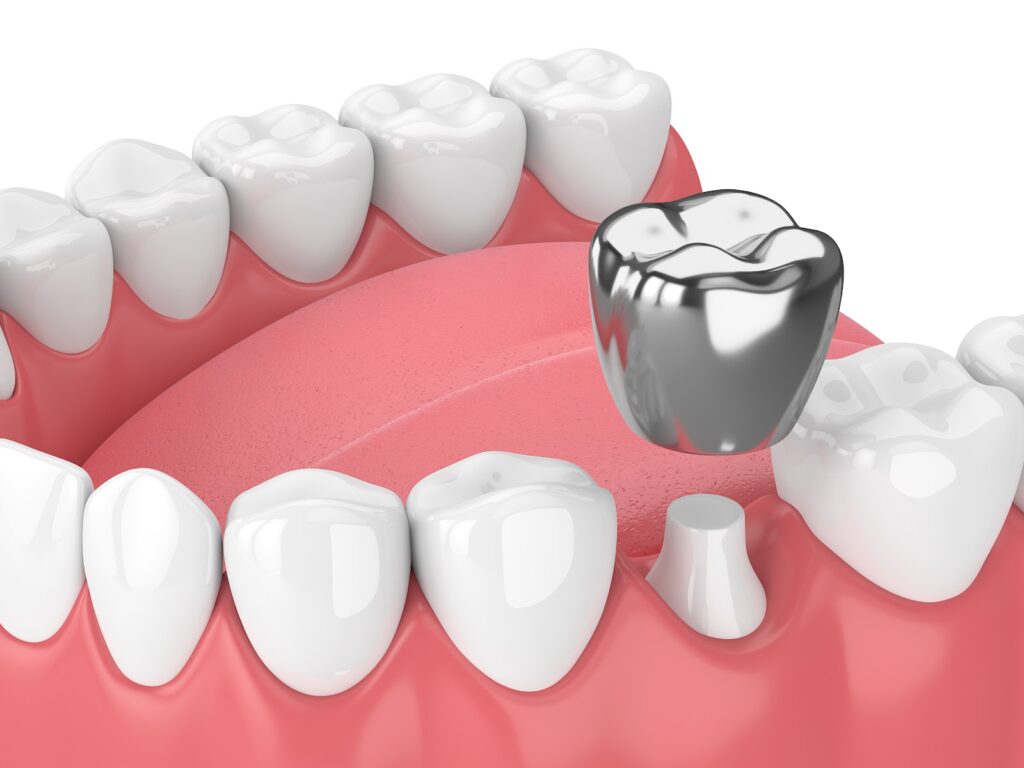Metal-based and steel crowns are often referred to as silver tooth crowns, which are metal crowns designed to cap teeth. They’ve been used for decades to provide durable and reliable solutions for teeth that have been damaged, are suffering from decay or need protection after a dental procedure (such as a root canal treatment).
Your dentist will always be able to tell you more about your options for treatment, but you may have things you wish to know about silver tooth crowns right away. This may be anything from the benefits of having one to how treatment works. We can provide all of that information for you here.
Read on to learn more or contact our clinic to book an appointment with an expert.

What Are Silver Tooth Crowns?
Silver tooth crowns are a type of crown or cap that is used to cover and protect a damaged tooth from decay, infection and general damage to the tooth. In the modern day, they are most typically made from a metal alloy of chromium, iron, and nickel. They may also be made from stainless steel. Real silver isn’t normally used in the making of these crowns, as the precious metal is too soft to withstand the wear and tear of day-to-day mouth functions such as chewing.
Silver tooth crowns operate in the same way as any other metal-based, gold or porcelain crowns. However, there are some advantages to silver and metal-based crowns that are not found in porcelain or resin crowns.
Is Mercury Used in Silver Tooth Crowns?
Mercury is used in amalgam fillings but is not commonly used in silver tooth crowns.
Mercury is typically used in silver fillings because it’s very versatile and is able to easily fill any gaps, cracks or holes within the affected tooth. It is mixed with alloy powder so that it can be gently pressed into the tooth. The placed mercury will harden very quickly, so the procedure is fast.
Silver tooth crowns, by comparison, may appear silver but are actually made from stainless steel and are composed of chromium, nickel and iron.
The Process of Fitting a Silver Tooth Crown
All tooth crown procedures follow the same process, the only difference is the type of crown being applied to the affected tooth. However, depending on what your dentist has suggested, you will be booked info for a same-day or multi-day procedure.
For Same-Day Procedures
Your dentist will take digital pictures of your mouth to assess what work needs to be done to the affected tooth or teeth. From the scan, your dentist will create a crown then and there, creating a crown that fits over the damaged part of your tooth. Once the crown is ready, dental cement will be applied to the affected tooth to hold the new, silver implant in place. You can expect to be in and out of the clinic within 2 – 4 hours.
For Multi-Day Procedures
Multi-day procedures, as the name suggests, require you to come back for further treatments. On your first visit, your dentist prepares your tooth for crown placement. They may also take an X-ray for a more in-depth look at the condition of your tooth. Next, your dentist will file down the outer layer of your tooth and an impression will be taken of your newly trimmed tooth and your surrounding teeth.
A temporary crown is then placed over your tooth until your permanent crown is ready for placement. This could take up to four weeks depending on your dentist’s schedule.
On your second visit, your dentist will apply your new, permanent crown.
The Main Advantages of Silver Tooth Crowns
Silver tooth crowns benefit from being extremely durable and are able to withstand large amounts of pressure from biting. As with any other metal-based crown, silver tooth crowns are more durable than porcelain or resin, and they will also last longer, making them a more cost-effective option.
The Disadvantages of Silver Tooth Crowns
The main disadvantage of silver tooth crowns is that they are very obvious if placed near the front of the mouth. Silver and metal crowns are typically placed on molars because they are further back and are less likely to be immediately visible.
Do You Require a Silver or Metal-Based Crown?
If you require a tooth crown due to a damaged or decayed tooth, you can arrange a consultation with our team at Hove Dental Clinic. We will be able to quickly assess the condition of your teeth and mouth and provide an appropriate treatment solution to ensure your oral health remains in top condition.
To book your appointment, call the number above or complete our contact form.




















